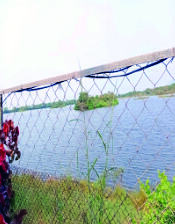The man who calls the crocodiles

Raipur: Last week, I had the pleasure of visiting the famous Crocodile Park in Janjgir-Champa, Chhattisgarh. It is roughly a 3-hour journey by road from Raipur. The park is situated in the village of Kotmisonar of the Akaltara tehsil. The lake, inhabited by the crocodiles is spread in 85 acres. It has approximately 340 crocodiles of different shapes and sizes. The lake is surrounded by tall fences to prevent any public harm and to keep the wild ones at a safe distance.
But, more interesting than the crocodiles is the man, on whose call these wild beasts come to the shore of the lake like pet animals. He calls them in Chhattisgarhi. He calls them by saying – "Aa, Aa, Daudi, daudi aa, jaldi, jaldi aa". Meaning, come, come, run and come, come fast.
He repeats this, many a times and in a very loud voice. And shockingly, the crocodiles do come. I saw 3 of them on my visit, one of them was approximately 12 feet long. More interesting to see is that the crocodiles come only on his call. They seem to recognize his voice and surprisingly, the language in which he calls them. It was very peculiar to see these wild beasts not only understanding the language but also obeying the commands, as they came swimming towards the shore. I have to admit that I have never seen anything like this. And the fact that despite being wild, the crocodiles obey and lie on the shore as long as he doesn't tell them.
When I first saw him, I thought he was a hermit. He wears saffron robes and has a white beard. And he actually is. For the past 50 years, he has been living in the Math Mandir Trust, and also looks after the temple.
And the thing that catches your eye the moment you see him is the fact that a part of his left hand is missing. I came to know that he lost his hand to a crocodile of that very park. At that time, there was no fence barricading the lake. The crocodile had grasped his hand between his teeth, so he had to cut his hand loose in order save the rest of himself from being eaten alive. He must be in his sixties now.
Hearing this made me think that if anybody else had been in his position, he would have resented and feared crocodiles for the rest of his life. But this man did the exact opposite of it. His occupation revolves around the culprit of his loss. He calls the crocodiles, feeds them, cares for them, and the most important as well as the most shocking thing I felt while listening to him is that he loves them.
He was telling about how some of the crocodiles had been taken away to the Jungle Safari in Raipur. Despite the protests of the local villagers, some of them were still taken away.
He said, "Sabko le gaya, sahab. Hamare bulane pe wo sab aa jata tha aur wo sabko le gaya." Meaning, they took them all away, sir. They would all come at my call and they took them all away. He said this with such profound sadness, that for a moment one might believe that his own children had been taken away.
He has this affection for the wildlings because, believe it or not, he has brought up many of the crocodiles from hatchlings. The crocodile who was responsible for his loss was also taken away and he was sad for that one too. More surprising is the fact that, he just wants to spend the rest of his life with his crocodiles, dedicating his life for their care. He said, "Hamara pura zindagi issi me hai, sahab. Humko aur kuch nahi chahiye." Meaning, my whole life is here, sir. I do not want anything else.
Seeing him, meeting him and listening to him has had a profound effect. Caring and dedicating your life to the one who is responsible for such a grave loss and is also responsible for giving you a near death experience, is beyond what any words can express. We, as people have so much to learn from him.
So, if you do have a chance to visit the Crocodile Park, look out for a man in saffron robes. People will say he is "The man who lost his hand to the crocodile", some might say he is "The friend of crocodiles", but I want you to remember him as Sitaram Das – "The Man Who Calls the Crocodiles."



